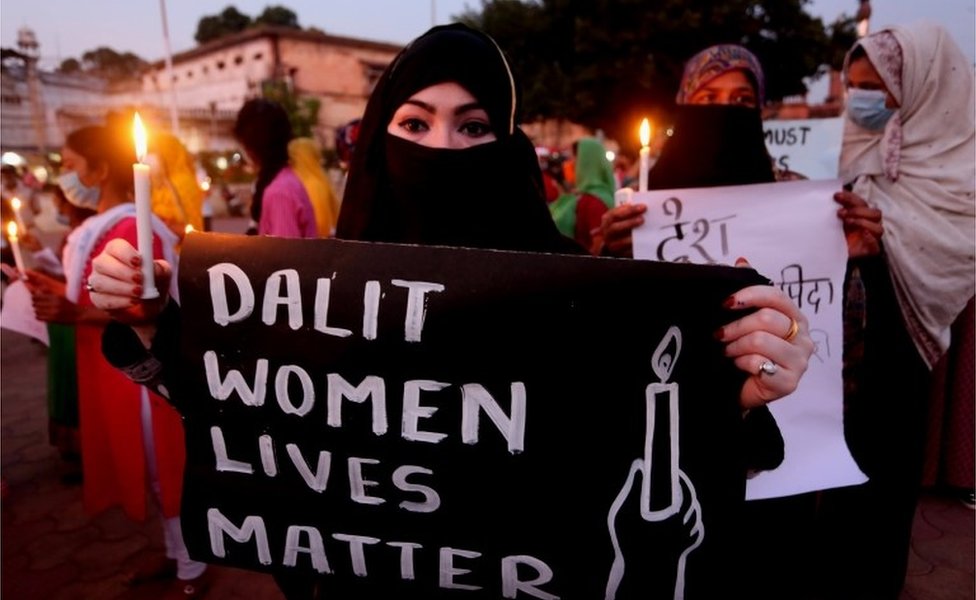Campaign against caste-based sexual violence highlights 'pervasive discrimination faced by Dalit women in India'

National Council of Women Leaders (NCWL) said that its campaign will showcase caste-based sexual violence in 15 Indian states, sharing a selection of landmark cases of crimes against Dalit women and girls dating from 1985 to now, which demonstrate the long term, deep-rooted nature of this systemic targeting.
TCN News
INDIA – Working in collaboration with Dalit Human Rights Defenders Network (DHRD-Net), Equality Labs, and Equality Now, the National Council of Women Leaders (NCWL) has launched a national campaign running from July 19 to August 31 2021, that aims to draw much-needed public attention to how Dalit women and girls are being deliberately subjected to widespread sexual violence and harassment stemming from severe, pervasive and intersectional discrimination tied to their gender, caste and class.
National Council of Women Leaders (NCWL) is a newly established coalition bringing together over 70 women leaders from across India who belong to a range of marginalized backgrounds and have been working at the grassroots to support and empower disadvantaged women and girls in their communities. Breaking new ground by creating a high profile platform exclusively for women from different marginalized groups, NCWL was established in February 2021, with the mandate of facilitating cooperation, collaboration, and amplification of collective solidarity and expression. The Council is forging a unique space for members to celebrate their own identities, raise their voices and boldly champion the rights of women and those from communities facing discrimination.
In a statement, NCWL said that “vulnerably positioned at the bottom of these social structures, the socioeconomic disadvantages and low political status of Dalit women and girls increases
their exposure to human rights violations, while simultaneously reducing their ability to escape harm or access justice.”
NCWL said that sexual violence is being used by those in dominant positions as a weapon to assert power and reinforce existing hierarchies. “Dalit women and girls are often subjected to more severe or aggravated forms of sexual violence, such as gang rapes or rape with murder, and there is commonly a collective nature to these crimes, with offenders from dominant castes acting in groups to commit offences,” the statement read.
NCWL pointed out that survivors of sexual violence, particularly those from marginalized communities, struggle to obtain justice within India’s legal system. “The horrific gang-rape and murder of the 19-year-old Dalit woman in Hathras, and the deplorable way in which it was dealt with by many in authority, has shown a spotlight on how men from dominant castes are granted protection and impunity at all levels,” NCWL said.
Perpetrators of sexual violence and abuse know they are far less likely to face punishment if they commit a crime against members of the Dalit community because attacks are rarely investigated or prosecuted, NCWL said. “Police often refuse to register cases, coerce survivors into compromises, or declare cases false,” they said.
For the small proportion of sexual violence crimes that India’s criminal court system does prosecute, conviction rates remain abysmally low. “Survivors and their families who seek legal justice are often subjected to extreme pressure to stay silent, and cases that do make it to court mostly involve the most egregious crimes, such as when the victim has been killed or is a young girl,” NCWL pointed out.
Data from India’s National Crime Records Bureau (NCRB) in 2019 reported that ten Dalit women and girls are raped every day in India. “Extensive under-reporting, problems registering sexual assaults with the police, and the sharp rise in sexual and gender-based violence since the onset of the Covid-19 pandemic, mean the true figures are likely to be considerably higher,” they said.
NCWL said that its campaign will showcase caste-based sexual violence in 15 Indian states, sharing a selection of landmark cases of crimes against Dalit women and girls dating from 1985 to now, which demonstrate the long term, deep-rooted nature of this systemic targeting.
NCWL will also report on developments - or lack thereof - in how the criminal justice system and others in authority respond to such cases, noting the specific barriers that survivors of sexual violence face which prevent them from receiving justice or support.
Throughout the campaign, NCWL will be hosting a series of activities, bringing together women’s rights activists to share experiences and methods, advocate for positive change, and hold duty bearers to account. Data, visuals, and other creative tools to communicate the problem to a broader audience will be provided, alongside videos of activists working with survivors and victims’ families from marginalized communities. The campaign will culminate in the creation and sharing of key recommendations for policymakers, government authorities and civil society to improve responses to cases of caste-based sexual violence.
